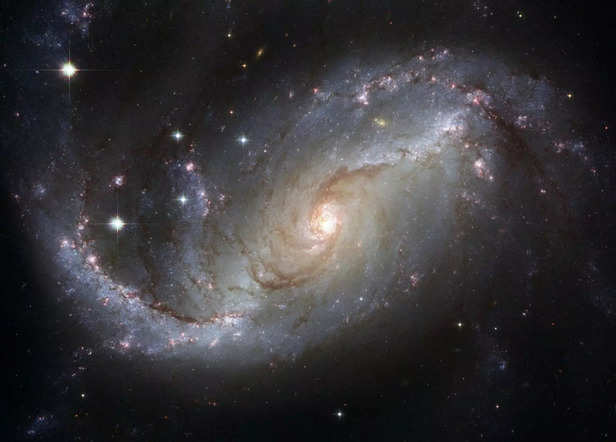Is Hinduism the Most Scientific Religion? What Researchers Are Discovering
Riya Kumari | Mar 10, 2025, 23:58 IST
( Image credit : Timeslife )
You ever have one of those moments where you’re scrolling through social media, half-awake, coffee in hand, and you stumble upon a post that says, “NASA confirms Sanskrit is the most scientific language in the world”? And suddenly, you're fully awake, blinking at your screen like, Wait… what? And then, like any self-respecting overthinker, you go down a rabbit hole. Quantum physics, Vedic texts, Ayurveda, time being cyclical instead of linear—suddenly, you’re questioning if your high school science teacher was just plagiarizing ancient Hindu sages.
Some truths reveal themselves slowly. Others sit in plain sight, waiting for us to look at them with fresh eyes. Hinduism has always been a living, breathing system of knowledge—not just a religion, but a way of seeing the universe. Today, as science pushes the boundaries of reality, it keeps stumbling upon ideas that Hinduism has carried for centuries. Coincidence? Or are we simply rediscovering what was never lost?
1. The Science of the Cosmos

In 1929, Edwin Hubble discovered that the universe is expanding, changing our understanding of existence. Yet, thousands of years before modern astronomy, the Rig Veda quietly stated: "The universe expands and contracts endlessly."
This isn’t a poetic metaphor—it’s a direct description of the cyclic nature of the cosmos, something modern physics is only now beginning to grasp. The concept of multiple universes? Described in the Bhagavata Purana. Time as non-linear? A fundamental idea in Hindu cosmology. The more we learn about black holes, dark matter, and quantum physics, the more eerily familiar it all starts to sound—almost as if we’ve been here before.
2. The Mathematics of Reality

Zero. The decimal system. Algebra. Trigonometry. The Fibonacci sequence hidden in temple architecture. We tend to think of science as a Western conquest, but long before Newton, Leibniz, or Pythagoras, Indian mathematicians were writing the foundations of how we understand numbers, space, and motion.
But here’s the real question: why did they need this knowledge in the first place? Because, in Hindu thought, numbers aren’t just numbers. They are the language of the universe. From the intricate geometry of the Sri Yantra to the precise calculations of planetary orbits, Hinduism has never separated spirituality from science. It sees them as two sides of the same truth.
3. The Biology of Life

For centuries, Ayurveda was dismissed as mystical folklore. Today, its principles are being validated by neuroscience, psychology, and gut microbiome research. Western science is only now realizing what Ayurveda has always known: The gut influences the mind. Breath controls emotional states. Food isn’t just fuel—it’s information for the body.
We marvel at how mindfulness changes the brain. We conduct studies to prove that deep breathing reduces stress. But these are not discoveries; they are memories. Hinduism has always known that the human body is not a machine—it is an ecosystem, deeply connected to nature, to time, and to the very fabric of existence.
4. Cause, Effect, and the Science of Karma

Newton’s third law: Every action has an equal and opposite reaction. Hinduism has a simpler way of saying it: What you do comes back to you.
Karma isn’t just about morality—it’s about causality. Every action sets something into motion, whether we see it immediately or not. This is not superstition; this is the logic of the universe. Every choice matters. Every ripple spreads. Science explains the how—Hinduism explains the why.
So, Is Hinduism the Most Scientific Religion?
Hinduism is not a science textbook. It doesn’t claim to be. It doesn’t ask you to believe—it asks you to think, to question, to experience. Unlike dogma, it evolves. It adapts. It holds knowledge, but it does not imprison it. Perhaps that is why, in an age where science and spirituality are often seen as rivals, Hinduism stands at the crossroads, reminding us that truth has never belonged to one side or the other. It is bigger than both. Maybe the question is not whether Hinduism is scientific, but whether science is finally catching up.
1. The Science of the Cosmos

Universe
( Image credit : Pexels )
In 1929, Edwin Hubble discovered that the universe is expanding, changing our understanding of existence. Yet, thousands of years before modern astronomy, the Rig Veda quietly stated: "The universe expands and contracts endlessly."
This isn’t a poetic metaphor—it’s a direct description of the cyclic nature of the cosmos, something modern physics is only now beginning to grasp. The concept of multiple universes? Described in the Bhagavata Purana. Time as non-linear? A fundamental idea in Hindu cosmology. The more we learn about black holes, dark matter, and quantum physics, the more eerily familiar it all starts to sound—almost as if we’ve been here before.
2. The Mathematics of Reality

Zero
( Image credit : Pexels )
Zero. The decimal system. Algebra. Trigonometry. The Fibonacci sequence hidden in temple architecture. We tend to think of science as a Western conquest, but long before Newton, Leibniz, or Pythagoras, Indian mathematicians were writing the foundations of how we understand numbers, space, and motion.
But here’s the real question: why did they need this knowledge in the first place? Because, in Hindu thought, numbers aren’t just numbers. They are the language of the universe. From the intricate geometry of the Sri Yantra to the precise calculations of planetary orbits, Hinduism has never separated spirituality from science. It sees them as two sides of the same truth.
3. The Biology of Life

Ayurveda
( Image credit : Pexels )
For centuries, Ayurveda was dismissed as mystical folklore. Today, its principles are being validated by neuroscience, psychology, and gut microbiome research. Western science is only now realizing what Ayurveda has always known: The gut influences the mind. Breath controls emotional states. Food isn’t just fuel—it’s information for the body.
We marvel at how mindfulness changes the brain. We conduct studies to prove that deep breathing reduces stress. But these are not discoveries; they are memories. Hinduism has always known that the human body is not a machine—it is an ecosystem, deeply connected to nature, to time, and to the very fabric of existence.
4. Cause, Effect, and the Science of Karma

Karma
( Image credit : Pexels )
Newton’s third law: Every action has an equal and opposite reaction. Hinduism has a simpler way of saying it: What you do comes back to you.
Karma isn’t just about morality—it’s about causality. Every action sets something into motion, whether we see it immediately or not. This is not superstition; this is the logic of the universe. Every choice matters. Every ripple spreads. Science explains the how—Hinduism explains the why.
